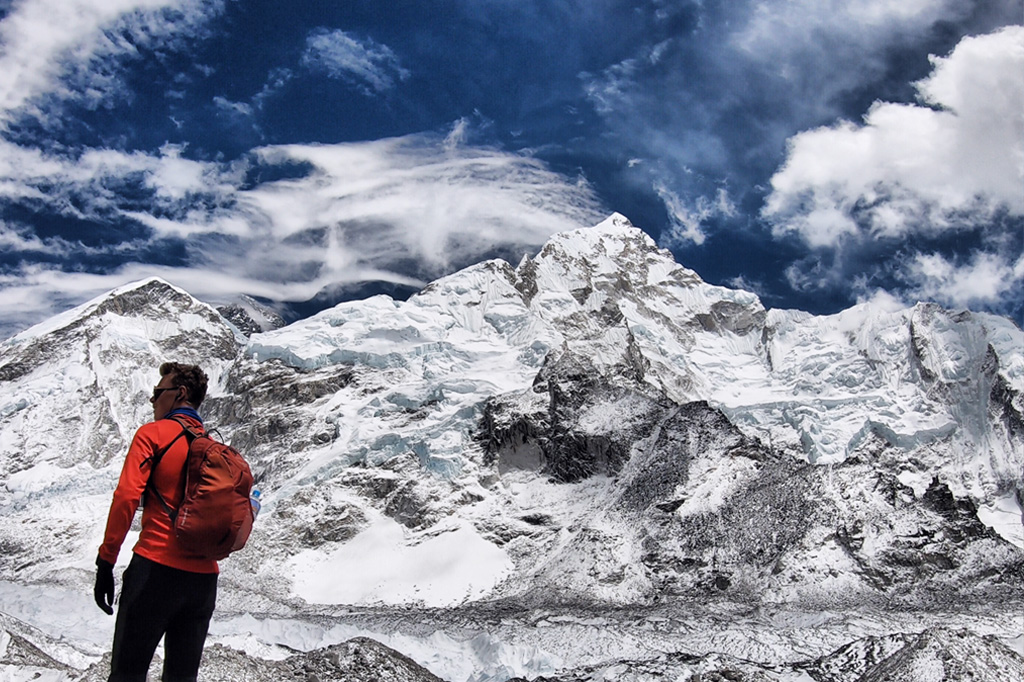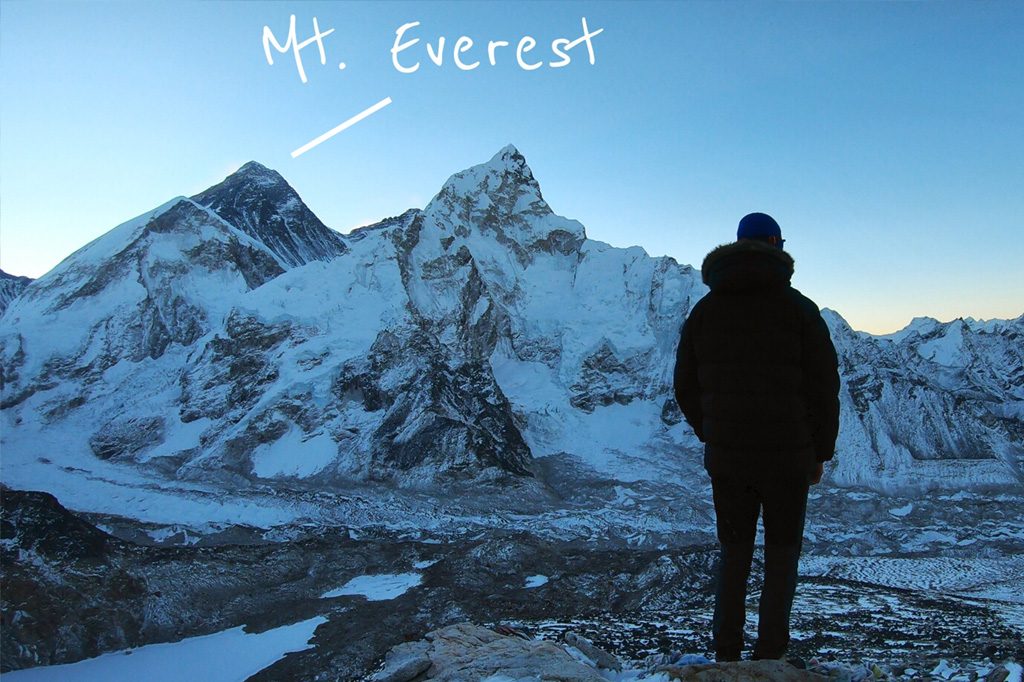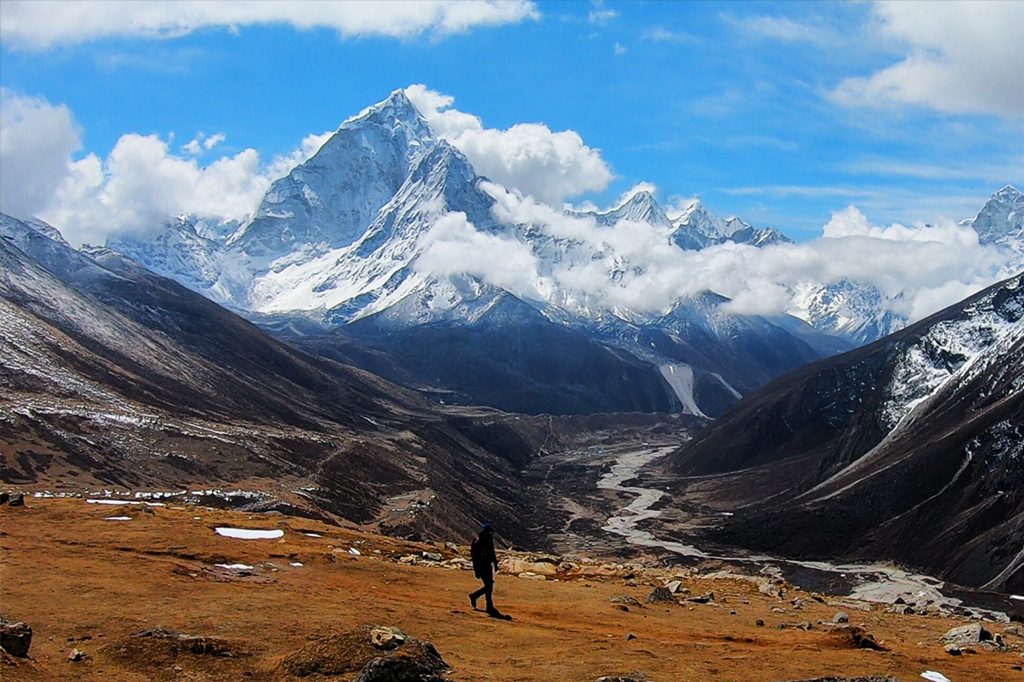High School: The Sage School
Post-Graduation Plans: Attending the University of Colorado, Boulder
The irrational drive of mountaineering creates a heightened self-awareness and sublime experiences due to its association with risk and challenge in vast landscapes. Climbing mountains in the form of recreation is easily considered to be innately unwise and irrational as it has no utilitarian use and can be extraordinarily difficult, dangerous, and painful. The argument for the irrationality and absurdity of mountaineering is certainly easier to make than the contrary. Many mountaineers have elaborated on “finding themselves” or “discovering their true nature” in the mountains. Many mountaineers who have lost limbs or experienced events involving great risk attest to significant personal transformations. In less critical scenarios, mountaineers report strong feelings of identity and clarity when in situations where great attention and care is needed.
One of the allures of spending time in high alpine environments through experiences of stress and challenge is their tendency to build willpower, strength of mind and spirit, and feelings of great personal growth or achievement. However, these experiences rarely come without hardship. This can include close encounters with frostbite, loss of limb or the death of yourself or a companion. Ironically, it is commonly reported by mountaineers that a great sense of being alive is achieved when they are close to death. Mountain literature in the past century has no lack of depiction of beauteous landscapes and the feelings they bring, or even the necessity of their presence in one’s life.
Experiences associated with vastness, such as outer space, oceans, and mountains, bring us feelings described as being akin to interactions with higher powers. This emotion is often described as “the sublime” and is a feeling of purity and admiration. These emotions, commonly realized when experiencing the grandeur of the mountains, are likely the greatest allure to mountaineering.
It should be noted that in this paper I am elaborating solely about experienced mountaineers: the select few people who passionately seek high alpine mountaintops as their primary effort in life. On the psychology of mountaineering, there is no easy answer. The discussion more often than not leads us to the question of why. As famed climber Tenzing Norgay once said, “Nothing made sense about it … Any man in his right mind would have said no. But I couldn’t say no, for in my heart I needed to go, and the pull of Everest was stronger for me than any force on earth” (Breashears, David. “Why Do People Climb Everest? The Roof Of the World As a Window Into Human Nature”).
Many describe the allure of mountains as if there is some force of gravity pulling them in, and great willpower is needed to resist. This emotion is a form of the allure of the mountains. Evidently, there is no such physical force, but the account is so common that there must be some authenticity to the claim.
It’s not a surprise that people who don’t climb mountains can’t understand why people would devote their lives to reach high alpine mountaintops. What is surprising is that mountaineers themselves cannot easily, if at all, put their finger on the reasoning behind their recreation. Social scientist George Loewenstein writes, “Once a mountaineer has set his sights on a peak, the goal of making the summit becomes detached from rational calculations about the cost of achieving the goal. Mountaineers are well aware of the difficulty of relinquishing their summit ambitions even when abandonment of the goal is strongly merited” (Loewenstein, George. “Because It Is There: The Challenge of Mountaineering … for Utility Theory.”) The goals that mountains represent seem to become less about the physical challenge and more about the irrational need to climb perceived mountains of the mind.
Evidently, the argument is far easier to be made for the irrationality and even the insanity of mountaineering than for its coherence. But, “as is often the case with things that seem insane … there may well be some deeper sanity in it.” (Breashears). One theory with substantial advocacy is that several weeks or months following an expedition, the participants often cannot recall certain unpleasant events that transpired with adequate depth. That’s not to say they cannot remember the experience in general, rather, they cannot always recall the specific hardships of their travels or the fear and doubt that they felt. To this point, Loewenstein writes: “Mountaineers cannot themselves remember the miseries of climbing, this helps explain why they keep returning for more.” All that remained was the stunning view, how fulfilling it felt to stand on the summit, and the anticipated return to comfort and safety.
But when considering why mountaineers do what they do, we must consider why, in fact, any of us do what we do. If asked the question, would any of us find it any less difficult to explain the reasoning behind our recreation? Climber Lou Kasischke posed the question: “Why would anyone ever want to climb Mount Everest? My standard answer was not very convincing, even to me… How does anybody ever really know why we do what we do?” (Breashears). The reality is that all of us do things that may seem irrational to the outside viewer, sometimes even to ourselves. As climber and writer Jon Krakauer put it: “Most climbers aren’t in fact deranged, they’re just infected with a particularly virulent strain of the Human Condition.” (Breashears). Mountaineering may seem insane at first glance, but, when the topic is navigated, we all can relate to the irrationality of sport.
Mountaineers are often the test subjects of these curiosities. For example, if a football player was asked to argue for the rationality of his sport, I can only assume he would have great difficulty, as there is no utilitarian use for running across a field and hitting people to transport a ball.
The epiphanies of identity and self-awareness that can come from mountaineering are a strong allure of the sport. Heightened experiences such as risk, challenge, or mastery over environment and self in mountaineering can inspire subtle, or even transcendent, change in people who experience it. “The Buddhist monk of Tibet may declare ‘Why climb so far when with one bound my spirit can tread in peace and serenity what your feet must win so painfully?’ But we in the West believe that it is only through our physical as well as mental selves, through toil, struggle, difficulty, and danger, that we discover the true worth of the spirit, and that to rise superior to his environment is the greatest privilege of man’” (Lester, James. “Spirit, Identity, and Self in Mountaineering”).
Mountaineering accounts are laden with self-discovery due to struggle and risk in the mountains. There is something about being exposed in natural environments that inspires a heightened sense of identity. “The stresses of high-altitude climbing reveals your true character; they unmask who you really are. You no longer have all the social graces to hide behind, to play roles. You are the essence of what you are” (Breashears). Mountaineering often necessitates participants to push themselves to the extremes of their physical and psychological capacities to achieve their goals. Interestingly, that is part of the allure of mountains, likely due to the benefits reaped from the hardships involved with the mountains and the challenge summits represent.
“One needs to have some appreciation of the hardships of mountaineering, which are amply catalogued in the mountaineering literature. They include relentless cold (often leading to frostbite and loss of extremities, or death), exhaustion, snow-blindness, sunburn, altitude sickness, sleeplessness, squalid conditions, hunger, fear, and realization of that fear (in the form of accidents)” (Loewenstein). Going through conditions such as these, people change, stirring a greater appreciation of mortality and a reevaluation of priorities in their lives. “We are not proud enough of being alive” (Loewenstein). The change that is experienced, however, can take many forms. Maurice Herzog, The first man to climb an 8,000-meter peak, who lost several fingers and parts of his hands and feet to gangrene, reported a quite unexpected result of his injuries. The ordeal, he said, “has given me the assurance and serenity of a man who has fulfilled himself. It has given me the rare joy of loving that which I used to despise. A new and splendid life has opened up before me” (Loewenstein). Of course, it doesn’t always turn out this way. It has been reported that mountaineers can experience little to no fear during times of extreme risk and toil. However, several days later, in a safe environment, they reported feeling petrifying and crippling fear for long periods of time.
One of the greatest and most alluring feelings of identity mountaineers can feel is due to an ability to feel safe or in control in situations of severe danger or risk. Famed climber Reinhold Messner once said, “To be alone and trusting in my own abilities gave me a strong feeling of identity” (Lester, James. “Spirit, Identity, and Self in Mountaineering”). These emotional epiphanies typically come only after safety or summit is achieved and are partially due to acute mental clarity. In my findings, situations in the backcountry—especially in frigid temperatures that necessitate all your attention—clear the mind more than a year’s meditation. Once safety and comfort is achieved, the mind effortlessly makes heightened realizations about identity and the true nature of the self.
Motives behind the relationship between mountaineering and the self aren’t exclusive to discovery, nor mastery over environment. “Inherent in every virile man is the desire to rise superior not only to his environment, but to himself” (Lester). Mountaineers seek not only discovering the true nature of the self, they seek to improve it. The mountains offer battlegrounds for the spirit, in which your will is put against the elements and itself. Some go mad, some acquire chronic fear, and some achieve lasting peace and happiness following their expeditions. With every expedition one becomes stronger-willed, more experienced, and with this a person bears more respect among his peers and abroad. “One of the most common remarks in climbing accounts has to do with feeling in touch with something not just stronger, but better within one’s self in the mountains—purer, more honest, more authentic we would say today” (Lester). There is a great lust for the triumph of the greater self over the deemed lower self.
Hardship in mountaineering seems to have qualities that support strong feelings of personal prosperity. The evident truth here is that physically climbing mountains has great connection to climbing mountains of the mind. This may explain why mountaineers are so inherently goal oriented. As Sir Edmund Hillary put it: “It’s not the mountains we conquer, but ourselves” (Parks, Rosa. “Sir Edmund Hillary, Conqueror of Mount Everest”). The opportunities to summit physical mountains as a means to climb mountains of the mind can carry great appeal for many.
Another allure of the mountains is the sublime emotions we experience in the grandeur of their vast nature. Mountains have long been realized as places of great beauty. However, mountaineers have reported feelings far greater than a simple charm of appeal. “Whereas the beautiful in nature is bound by a definite form, the sublime is evoked by the formlessness and unboundedness of the object of experience” (BÜYÜKTUNCAY, Mehmet. “John Muir and the Natural Sublime In The Yosemite”). Sublime, as an adjective, is defined as being “of such excellence, grandeur, or beauty as to inspire great admiration or awe.” Mountaineers’ relationship with the sublime is through experiencing great vastness, which the towering mountains administer without repent. “The discovery of space through the invention of the telescope allowed new avenues for people to appreciate God. Thinking about the vastness of space, oceans, and mountains allowed people similar feeling to experiencing deities in a lens of the unknown and mysterious. These developments led to the concept of the sublime. Mountains, the sea, and all things vast becoming examples of the sublime and thus considered as ‘triggers for the highest and purest feelings’” (Lester). The mountains hold great weight in this regard as there are few things that make you feel smaller and command more admiration than mountains. Being a little speck looking up at the grandeur of great peaks can make one feel as if in the presence of the gods.
It is because of this that mountains are mentioned over 500 times in the Old Testament. In fact, mountains are deemed as being holy in many religions perhaps because they are seen as being closer to God. “In the ‘esthetic of the infinite’ the value of vastness was that it produced an “expansion of the soul” (Lester). Mountaineers and Buddhist monks alike seek to improve their spirit and will, and both find it in the sublime experiences of the vast mountains of the Himalayas. Many mountaineers will seek inner council and peace of mind in sublime feeling found in mountains.
All who spend great amounts of time in mountains understand the undeniable admiration for their environment. The mountains are not a forgiving environment. One must acquire certain skills to survive here. Depending on your activities in the mountains, the danger that comes with them can be quite extreme, yet for many there is great peace in mountains. “How great are the advantages of solitude! How sublime is the silence of nature’s ever-active energies! There is something in the very name of wilderness that charms the ear, and soothes the spirit of man. There is religion in it” (Nash, Roderick. “Wilderness And The American Mind”).
The romanticism behind mountains has been explored for centuries, and demonstrated in art, poetry, and writing. “Further down the line we get Byron and Shelly, preoccupied with the solitary wanderer, a creature alienated from the customary world seeking ‘strange truths and undiscovered lands’” (Lester). The spread of romanticism in mountains through different art forms is part of what has put mountains in such a glimmering light—as opposed to being a curse on humanity, that which it was thought of in the Middle Ages. And the sublime nature of mountains, which had not been broadly realized in those times, is greatly to thank for this revolution.
To sum things up, mountaineering does not seem like a logically enjoyable thing to do. But when considering why mountaineers choose to climb mountains, we must consider what they gain from all of it. In truth, mountaineers don’t enjoy every second of their expeditions. In fact, they may not enjoy them at all. Many mountaineers describe climbing Everest as a test of how much pain you can endure. Yet they keep doing it, because what they gain and what they remember of their expeditions is too tantalizing to resist. The feeling they achieve upon summiting completely washes away the fear that they weren’t going to make it or the piercing cold they fought through the night before. Once they are back in their warm home and soft bed, all they want is more. Mountaineering is irrational. So is the Tour de France, skydiving, and football. Charley Mace, who has climbed the highest summit in each continent, had a far simpler answer than all this, “It just feels right.”
Mountaineers gain sought after feelings of identity in the mountains as well. “According to Taylor, the ‘search for self in order to come to terms with oneself … has become one of the fundamental themes of our modern culture’” (Davidson, Lee. “A Mountain Feeling: The Narrative Construction of Meaning And Self Through A Commitment To Mountaineering In Aotearoa, New Zealand.”).
However, the allure of the identity gained from mountains is more subtle than all this. It’s the feelings mountaineers get when they feel confident and comfortable in their own abilities to keep themselves safe even in extreme danger. There is something innately revealing of one’s true nature in experiences such as these. Simply being in the mountains brings heightened feelings of purity and admiration of the landscape, which is described as the sublime. Feelings of the sublime are experienced from the great vastness and grandeur of the mountains and can leave one feeling dwarfed by such magnitude. The beauty of memories regarding sublime experiences in the mountains can be an irresistible allure, despite any hardship. When a mountaineer wakes up after an extremely harsh and dangerous night and steps out his tent to see a sunrise over the Himalayas, my words could not do the experience justice. It is the purest and highest feeling on this earth for many, and some could not live happily without the mountains and any associated recreation. In truth, part of the allure of the mountains lies in the hardships and challenges that manifest themselves in summiting mountains. The hardships of the mountains translate to the hardships in other aspects of life. Mountaineers seek mountaintops, because at the top of each mountain is a new version of himself—one of greater will, richer spirit, and one that is rid of all thoughts besides the unequalled beauty of the rising sun on the mountains. The greatest allure of the mountains, for many, is the person that they will shape you to be.




